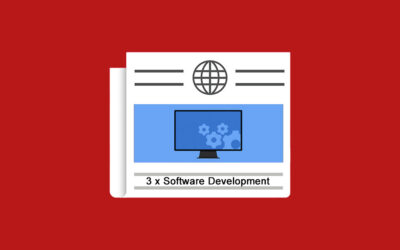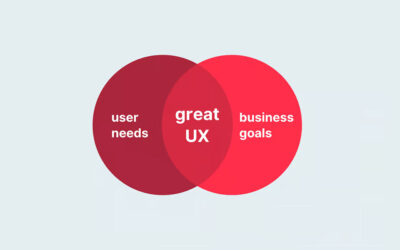A blog for people in organisations.
With useful, first-hand tips from experts.
Self-care: no more feeling guilty
Self-care is neither a luxury nor a reason to feel guilty. How can we integrate it into our day-to-day life and what practical approaches can help?
Keep Manager: Everything stays different
The sheer number of changes in organisations is often a major challenge for employees. How can a keep manager help against change fatigue?
Colocation as a driver for digital transformation
What is colocation, why are more and more companies using colocation services and how are they sustainably driving their digital transformation?
Oh, precious books
Are you looking for a selection of books worth reading? Here you will find a compilation of precious books with short interviews with the authors.
The language of appreciation
What does appreciation mean in the workplace and how do you recognise it? And what happens when managers value different things than employees?
Training management in healthcare IT projects
How can a well-thought-out concept improve training management in clinical projects and which modern learning methods are particularly effective?
Slicing Work – Essential skill for agility
Slicing work – the division of labour – is an important skill in organisations and for agility. What types are there and when is each useful?
Three questions about experience level agreements
Do experience level agreements (XLA) replace SLA? How can they be introduced and integrated into outsourcing contracts? Dierk Soellner has the answers.
Farewell as a leadership task
Dismissals are never easy for those involved. This is a guide for managers on how to handle farewells professionally, fairly and empathetically.
Impulses for organisations – Part 13
Lies in companies, the interaction between customers and software agencies, and the challenges of growing companies. 3 new impulses from 3 experts.
Disaster relief as a model for corporate crises
Overcoming corporate crises like disaster relief: What companies can learn from crisis professionals to remain resilient and capable of acting.
Three questions about clean code
What is Clean Code, how can it be introduced and used regularly in a team, and what is its relevance in the age of AI? Stefan Lieser has answers.
Open communication, strong corporate culture
Companies can strengthen their corporate culture step by step through open communication. How does this work in practice and what tips are helpful?
Do we really need this feature?
YAGNI is a well-known principle in software development. You ain’t gonna need it. Do companies really need all the features they want and pay for?
Sense and nonsense of pain points
In marketing and sales, pain points are considered potential sales opportunities. Do people really often buy because they want to relieve pain?
Back to loyal cooperation
Loyalty is a very valuable asset in many companies, but it can easily be lost. How can superiors reinstate loyal cooperation within a team?
Systemic questions: the path to new answers
Systemic questions support the path from problem to solution. What examples are there and what should be considered in practical application?
Form on the day in everyday working life
Companies pay little attention to form on the day. Why is that a mistake, what are the challenges in practice and what approaches are useful?
Value-based leadership: actions over words
Values have great potential when integrated into organizations systematically. How does the implementation of value-based leadership succeed?
Impulses for organisations – Part 12
The consequences of micromanagement, the reciprocal relationship between power and project planning with ChatGPT. 3 new impulses from 3 experts.
Using gamification for SEO
Gamification can help to sustainably improve the user experience on websites. How does search engine optimisation (SEO) work with gamification?
Advance your Product Backlog Refinement
When developing products, the Product Backlog Refinement is often critical to success. What big ideas help to advance the PBR to a different level?
New Work in the classroom
The integration of New Work into the education system offers a promising perspective for the future of schools. What are the success factors?
Is stress good or bad?
What function does stress fulfil? Why do people view stress differently, what role does mindset play and how can we deal with it successfully?
Our world of beliefs
Every person has beliefs. And so does every company. How and when do they come about, what are their functions and how can they be dealt with?
Role-based work in non-self-organised teams
What does role-based working mean, what challenges need to be overcome when collaborating and why does it also make sense in non-self-organised teams?
Delete strategy: Relief instead of overload
With increasing workloads, time management and self-optimisation are considered modern tools. But what really helps is the delete strategy.
Negative self-talk: risks and side effects
What influence does negative self-talk have on our behaviour, what are the foundations of mental imagery and what tool provides a way out?
A personal wiki for project managers
What are the benefits of a personal wiki, how do you build it to gain a good overview, and when does it make sense to create a team wiki?
Using AI for SEO
Is it worth using artificial intelligence (AI) for search engine optimisation (SEO) of your own website and what developments can be expected?
Agile washing
What is agile washing, what benefits do companies expect from it and how can they recognise the demand for true agility in practice?
Impulses for organisations – Part 11
Corporate communication in digital times, tools for systemic thinking and the use and customisation of processes. 3 new impulses from 3 experts.
How the meeting industrial complex hinders value creation
Do organisations need more and more meetings because the world is becoming increasingly complicated? And what does this mean for organisations?
Matrix organisation: formalised irresponsibility
Taking responsibility is a serious challenge at many levels in many matrix organisations. What are the causes and what should companies do?
Courageous leadership with heart
What are the key aspects of courageous and empathetic leadership and how can this create a value-adding environment? A report from experience.
Three questions about e-learning tools
When are e-learning tools worthwhile, what to do in the event of resistance and how to get started with digital training? Nadine Pedro has the answers.
Brainstorming with ChatGPT: creativity with limits
ChatGPT is used in many companies for brainstorming. In which situations is ChatGPT a good brainstorming partner and where does it get stuck?
Layered process audits: company layers in sight
What are layered process audits? What roles do checklists and checkpoints play in the audit? And what distinguishes LPA from other audits?
Stop your agile transformation!
Many agile transformations fail because organisations use the rules of classic change programmes. Why can’t this work and what is a better approach?
Podcast gems: listening pleasure at its best
Are you looking for podcasts about leadership and management, projects and programming, the future or innovation? You can find recommendations here.
Using conflicts in the team productively
In most organisations, conflict is seen as something bad, but this does not have to be the case. How can conflicts be utilised in a productive way?
Content is king for SEO
Content is the key to search engine optimisation (SEO). Why is content so crucial for good rankings and what is good content?
Challenges when replacing legacy IT systems
IT systems always age and at some point they have to be replaced. What are the challenges of replacing legacy IT systems beyond the technology?
Impulses for organisations – Part 10
Focus on employees, promotion and professional passion as well as the impact of personality in companies. 3 new impulses from 3 experts.
7 IT use cases with ChatGPT
How suitable is ChatGPT for typical development tasks? A practical test with 7 IT application examples and recommendations for action.
Sustainability and leadership expertise
Sustainability offers numerous approaches for improving leadership expertise. Why is sustainability so important for managers in general?
Leadership quality number 1: Self-care
Self-care is a important foundation for leadership. It begins with reflecting on how we deal with certain situations. Which tools help with self-care?
The principle of affordable loss
What is the principle of affordable loss? How does it work, when and in what situation does it help and what is special about the principle?
A holistic approach to software efficiency
What is software efficiency? Why is too little attention paid to this topic, which areas does it cover and why should it be considered holistically?
Three questions about uncertainty
How do personal values, cultural differences and new technologies influence how we deal with uncertainty? Astrid Kuhlmey provides answers.
The way back to the corporate office: reasons and solutions
Many companies want employees back in the office after remote work. What are the reasons, and how can this transition be successfully managed?
The concept of integral leadership
Leadership is complex. The concept of integral leadership offers managers different perspectives for thinking and acting holistically.
Self-efficacy as the key to (professional) fulfilment
Self-efficacy characterises our thoughts, actions and feelings. It is an essential ingredient for our success. And it can be developed!
Misunderstood agility
Agility is often seen in companies as a miracle cure to solve many problems. Unfortunately, the actual goal of agility is misunderstood.
How does value-adding offboarding work?
Many companies do not have a well-developed offboarding strategy and thus miss the opportunity to benefit from the experience of their employees.
The effectiveness of agile coaching – Part 2
One aspect of agile approaches is the assumption of responsibility by teams. How does team responsibility enhance Agile Coaching effectiveness?
Contradictory KPI in online marketing
The use of KPI in online marketing is widespread, but often aspects are measured that allow more than one interpretation and are thus contradictory.
A journey through the new world of work
The perfect job is not something you find, but something you create. And how do you achieve this in the new world of work? A field report.
Impulses for organisations – Part 9
Psychological security and the pursuit of harmony, why deterrent recruiting is important and how true learning succeeds – 3 new impulses from 3 experts.
The effectiveness of agile coaching – Part 1
Companies often argue about the effectiveness of Agile Coaching. How does the discussion work and why is it not effective?
Oh, books worth reading
Are you looking for books worth reading? Here you will find a selection of books with interviews with the authors, each answering three questions.
Asking the right questions when testing AI systems
Do we still need testers in the development of AI systems? And what questions do companies need to answer when testing artificial intelligence?
Tool-supported test design: A plea
The quality of software tests depends on the test design. What is the status of tool support and what does the discipline of test design need?
The Inner Development Goals
Change often entails altering behavior. What’s the role of Inner Development Goals (IDGs) in this? Why are they relevant for managers and employees?
Three questions about job adverts
How does my job advert stand out from the competition, how do I avoid whitewashing and should I use gender language? Madeleine Kern has answers.
Experience Level Agreements (XLA) – Part 2
Which frameworks for Experience Level Agreements (XLA) do IT service providers use? What requirements exist and what are the advantages?
Organisations develop by themselves
It is normal when tried and tested methods suddenly no longer work. What levers help to develop a sustainable organisation?
Cybersecurity: more than just a protective shield
Cyberattacks are a real threat to all kinds of organisations. Why is cybersecurity important beyond the use of technology and employee training?
Three questions about digital transformation
Enthusiasm, relevant skills and personal health are important aspects of digital transformation. Sandra Brauer provides interesting perspectives.
Experience Level Agreements (XLA) – Part 1
What is an Experience Level Agreement (XLA), what is the difference between SLA and XLA and what does XM address? A clarification of terms.
The variety of shared leadership
There are a number of terms associated with shared leadership that are not used consistently. Time for a definition and a few practical questions.
Design thinking, domain storytelling and API design
Design thinking and domain storytelling are considered to be useful methods, but do they help programmers in the design of application interfaces?
Design meets Easter Bunny
Yayoi Kusama is an important artist of the 20th and 21st centuries. Her fascination with design principles and the Easter Bunny is legendary.
How important is enthusiasm in change management?
What role does employee enthusiasm play in change? Should it be a goal in change management or is it unnecessary, unrealistic and even a hindrance?
Impulses for organisations – Part 8
Soft skills or human skills, effective discussions with traffic light cards, leading and following and mountain biking – 4 impulses from 4 experts.
What parameters does self-organisation need?
There are many opinions on the subject of self-organisation. Time for a look at design principles and the comments of a Nobel Prize winner in economics.
A different kind of effort estimation
Effort estimation in software development is difficult. How useful is it to do without them and which approach helps in practice?
Three questions about change management
What narratives exist in change management? How does collective understanding develop and how does change succeed? Stephanie Borgert gives answers.
Women want to lead and women can be leaders
If you can’t find women who want to take on management positions at your company, what can you do to make management roles more worthwhile?
Mindfulness as an opportunity for innovation
Why do companies often struggle with innovations that affect their own business model, and how can mindfulness help here?
Distributed autonomous microservices with event-driven architecture
What advantages do event-driven architectures offer for the development of distributed, autonomous microservices and what are the main challenges?
The hidden story of agility
What is the origin of agility, what reasons led to a new type of product development and what does this mean for agile applications today?
The 6 ½ phases of a communication concept
How does a company ideally create a communication concept? What is important in practice and how do the individual phases interplay?
Polywork: The new versatility in the world of work
What is polywork, what are the advantages in a changing world of work, what does the approach mean for labour law and voluntary work?
Obeya: The visualisation of relevant information
What is Obeya, what is it suitable for, why is the visualisation of information important and how does it work well in practice?
Fits into every diary: self-care
Self-care means different things to different people. Why is it still important, and not too egocentric, and how does it relate to leadership?
Three questions about software development
Why is software development so expensive and what is the significance of expertise, capacity and quality? Thomas Klingenberg provides answers.
Mindfulness as a recipe for success for innovative teams
Can mindfulness at team level really ensure that teams are more successful and innovative? And how does this work in practice?
The interplay between cyber security and business analysis
A lack of cyber security is a risk for companies and is changing the role of business analysis. Which practices ensure greater data security?
Impulses for organisations – Part 7
Useful mistakes, smart hypotheses on leadership, change of perspective and the important mandate for the Scrum Master – 4 new impulses from 4 experts.
How healthy are your projects?
Systemic work in projects is a holistic approach that enables projects to be viewed as part of a larger whole. What are core concepts of systemic work?
How do you promote employee loyalty?
Loyalty is one of the most valuable characteristics in cooperation and one of the guarantors of a company’s success. What can you do to promote it?
Three questions about the Scrum Master
Is the Scrum Master an entry-level role? Do they need technical expertise? And what is their career path? Michael Kuesters provides answers.
Gaming as a catalyst for empathy and team resilience
What influence does gamification have on empathy and resilience in a team? And what role do intrinsic motivation and reflection play in this?
The systematic organisation of software development
An efficient organisation is important for companies that develop software. How can such an organisation be set up systematically?
Artificial intelligence (AI) for everyone?
Artificial intelligence (AI) is seen as a miracle cure today, but are we creating more than just solutions to problems we’ve created ourselves?
Managers and the development of self-efficacy and collective efficacy
How can managers influence the development of employees’ self-efficacy expectations and collective efficacy?
Are you already a project ambassador?
What do project ambassadors do, what activities do they take on in the project environment and why do projects and organisations benefit from them?
How Pecha Kucha brings distributed teams together
Pecha Kucha is a presentation technique that works very well for onboarding team members. Which questions help and what are the benefits?
5 reasons why you should prioritise user experience
Great software needs a focus on good user experience. What are the benefits and reasons for consciously prioritising UX when developing software?
Elevator pitch for techies
A good pitch needs to be learnt. What forms are there in addition to the elevator pitch, how do they build on each other and what tips are useful?
The ideal annual appraisal
The image of annual appraisals is negative. This is due to many mistakes that organisations make when conducting them. What tips help?
Lean product development: the holistic extension of lean production
Lean product development is more than just the application of lean methods and tools to product development. What is behind the approach?
Effective practices for a successful software transition
It happens time and again that a software system is handed over to a new team. What effective practices help with the software transition?
Two years later: what the 4-day week really achieved
The start-up openpack has been working a 4-day week for two years. Time for a look at the idea, expectations, the introduction and insights.
Buy software or have it developed
Should software be purchased or custom-developed? What arguments support standard software, and which favor custom development? A pros and cons.
Design Thinking is life!
How has Design Thinking evolved in recent years? And how can it bring the greatest benefit to companies today?
How does professional onboarding succeed in IT?
21% of employees leave companies again if there is no professional onboarding. How does good onboarding work in practice?
How do you create feel-good moments?
Feel-good moments are all situations that put you in a good mood. How can you consciously create these moments in your everyday project life?
Team learning: A revolution in personnel development
What is team learning, why is the approach so revolutionary and which formats are particularly helpful when people want to learn together?
Impulses for organisations – Part 6
Learnfluencers as the key to a learning culture, low performance vs. low performers and freedom for intelligent working – 3 impulses from 3 experts.
Do you talk about needs in the team?
In every team there are individual and collective needs. What influence do they have on the culture of trust and cooperation?
Mission customer focus
Companies are increasingly demanding greater customer focus. Why does this make sense and how can it be achieved? And who determines its success?
Brand Purpose: The golden thread of successful companies
What is the significance of a meaningful brand purpose for companies, employees and customers? And how can it be developed in practice?
Feedback in action: More than just words
Feedback is an opportunity for companies. Unfortunately, they often forget one little thing, but it is elementary for the interaction with customers.
Forming hypotheses: The forgotten tool
Many companies dealt with possible solutions after a short description of the problem. Forming hypotheses beforehand would certainly make more sense.
Small Data: The great potential of tiny information
Small Data is an alternative to Big Data. What is behind it, what is special about it and how can companies use it internally and externally?
Prompting for project managers: How to increase productivity
As a project manager, do you want to increase your productivity through targeted prompting? Here you will find practical tips with concrete examples.
The thing with responsibility
Employees want to take responsibility, managers want to hand over responsibility. Why does this interaction work so rarely in practice?
Karl Meier and sustainability in companies
The topic of sustainability offers opportunities and possibilities for companies. But how do you get started with the topic and where do you find support?























































































































